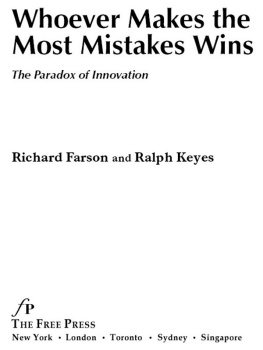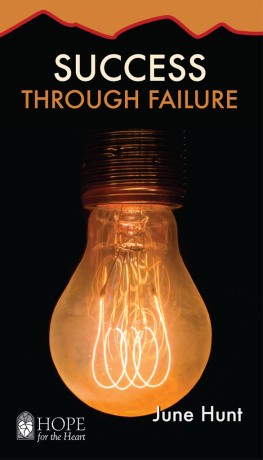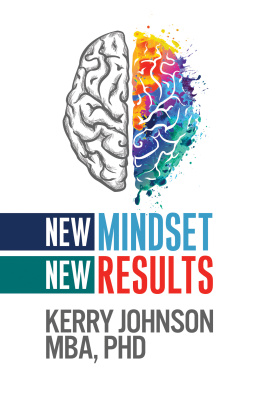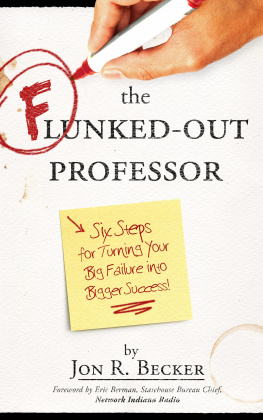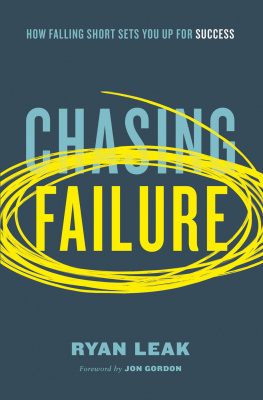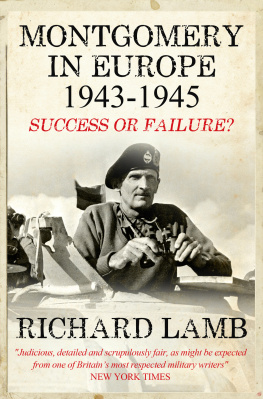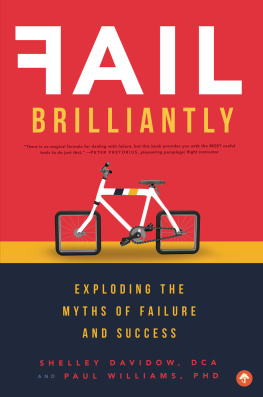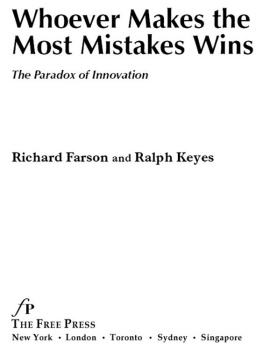More Praise for
Whoever Makes the Most Mistakes Wins
Its difficult to imagine a subject more compelling to most human beings than success and failure. Farson and Keyes present a refreshingly original point of view on the subject that illuminates a paradox and challenges our assumptions about how to tell one from the other.
MILTON GLASER, PRESIDENT, MILTON GLASER, INC.
Truth always seems to come in small paradoxical packages. This delightfully readable package by Farson and Keyes brilliantly fuzzes the frontier between success and failure, and thus reveals the fusion of opposites as the essence of truth.
HARLAN CLEVELAND, PRESIDENT EMERITUS, WORLD ACADEMY OF ART AND SCIENCE
Whoever Makes the Most Mistakes Wins promises to become a classic in the genre of modern wisdom literature that includes Eric Bernes Games People Play and Laurence J. Peters The Peter Principle . Its unexpected turns, liberating humor, and shrewd observations about social creativity and business innovation have the flavor of Mark Twain mixed with Zen and Taoist ribaldry. This is a wonderful book!
MICHAEL MURPHY, FOUNDER, ESALEN INSTITUTE, AND AUTHOR OF G OLF IN THE K INGDOM
As we move into the twenty-first century, an age of increasingly revolutionary technological advances, the concepts of success and failure must be reinterpreted and transcended if we are to be truly innovative in our ideas and discoveries. Richard Farson and Ralph Keyes provide an insightful and original examination of these concepts and of the critical need to redefine them in the postmodern world.
RICHARD C. ATKINSON, PRESIDENT, UNIVERSITY OF CALIFORNIA
Fabulous! I love this book. Its like a Zen koan: concise, wise, inspiring, and instructive. It is a modern guidebook for how to embrace paradox and free yourself from fear of failure. In a time when were subjected to a host of irrelevant, sappy, or overly simplistic self-help books, this book provides intelligent, truly useful advice.
MARY BOONE, PRESIDENT, BOONE ASSOCIATES, AND AUTHOR OF L EADERSHIP AND THE C OMPUTER AND M ANAGING I NTER @ CTIVELY
As one who has led a large association with many employees, I wish I had had this book years ago. It is timely and something every reader will find helpful at the personal, interpersonal, and managerial levels. This is a rare must read book that is also easy to read.
HORACE B. DEETS, FORMER EXECUTIVE DIRECTOR, AMERICAN ASSOCIATION OF RETIRED PERSONS
From my perspective in the field of art and design, the lucky mistake is often the uncredited key to any significant breakthrough. In their new book, Farson and Keyes introduce the business world to the designers most secret ally.
JOHN MAEDA, ASSOCIATE PROFESSOR OF DESIGN AND COMPUTATION, MIT MEDIA LABORATORY
Richard Farson and Ralph Keyes have hit on something big with this book. I say that as a man with a large and embarrassing pile of mistakes littering the road behind him. The fact is that some of those screw-ups hurt, some even kicked off a crisis, but all of them helped me in life. Failure is to success as a second wing is to a bird. You need it and so does he. It is unlikely either of you will fly without it. Pick up this smart, influential book and find out how those mistakes youve made, the ones you thought crippled you, can work to your advantage.
AMBASSADOR RICHARD CARLSON, FORMER DIRECTOR-GENERAL, VOICE OF AMERICA, AND FORMER PRESIDENT AND CEO, CORPORATION FOR PUBLIC BROADCASTING
This is a valuable book for just about anyone in our competitive world. The authors make a clear case for understanding that failing precedes almost all great wins in our society, and that tolerance, if not love, of failing creates the most successful environment. There are many interesting anecdotes and arguments throughout this most persuasive book.
JANE ALEXANDER, ACTRESS, AUTHOR, AND FORMER CHAIRMAN, NATIONAL ENDOWMENT FOR THE ARTS
This book is a great readinteresting and enjoyable. Its title can be taken literallywhoever makes the most mistakes will, in fact, win. I think most successful managers reach the same conclusion, but late in their careers. Farson and Keyes have finally explained this successful style of management, one many of us have observed. I certainly hope their message reaches the business schools, so graduates can start off on the right foot. Where were they when I needed this book?
RAYMOND ALDEN, FORMER PRESIDENT, SPRINT
This book is a welcome antidote to the numbing conventional wisdom about what constitutes corporate success and failure. It shows how to make the business environment both vital and humane.
RICHARD POLLAK, CONTRIBUTING EDITOR, T HE N ATION , AND AUTHOR OF T HE C REATION OF D R . B: A B IOGRAPHY OF B RUNO B ETTELHEIM
In an age where everyone is looking to win with simple formulas, it is so refreshing to have a more thoughtful and wise discussion of what winning and losing really mean, and how learning is more important than either one.
EDGAR SCHEIN, SLOAN FELLOWS PROFESSOR OF MANAGEMENT EMERITUS, MIT SLOAN SCHOOL OF MANAGEMENT

THE FREE PRESS
A Division of Simon & Schuster, Inc.
1230 Avenue of the Americas
New York, NY 10020
Copyright 2002 by Richard Farson and Ralph Keyes All rights reserved, including the right of reproduction in whole or in part in any form.
THE FREE PRESS and colophon are trademarks of Simon & Schuster, Inc.
Designed by Paul Dippolito
Library of Congress Cataloging-in-Publication Data
Farson, Richard Evans, 1926
Whoever makes the most mistakes wins: the paradox of innovation / Richard Farson and Ralph Keyes.
p. cm.
1. Technological innovations. 2. Success in business. 3. Success.
I. Keyes, Ralph. II. Title
HD45 .F357 2002
658.409dc21 2002019861
ISBN-10: 0-7432-5442-2
ISBN-13: 978-0-7432-5442-7
Visit us on the World Wide Web:
http://www.SimonSays.com
For my grandchildren,
John, Page, and Savannah
Richard Farson
For Gerry Cohen, who has
always supported me, even
when I made mistakes
Ralph Keyes
Contents
Acknowledgments
We would like to acknowledge help from the following people:
For ideas that contributed to our own thought processes: Carlos Campbell, Michael Crichton, Dawn Farson, Hallock Hoffman, Doug Land, Kate Ludeman, Jim OToole, Edwin Nystrom, Alex Soojung-Kim Pang, Charlton Price, John Shlien, Jim Skelly, Hall Sprague, Andrea-Lawrence Stuart, and Susan Waitley.
For helpful critiques of an early version of the manuscript: Andrea Adkins, Lou Heckler, and Robert Scherer.
For acute editing: Noel Greenwood and Burton Beals.
For encouragement and helpful suggestions, including the suggestion that we write this book: Margret McBride, the agent who represented it.
For capably shepherding the book to publication: our editor, Fred Hills.
Introduction
What if your concepts of success and failure were to change dramatically? Suppose the paths to either turned out to be completely different from those youd been shown? Imagine not even being able to distinguish one from the other, and entertain the idea that succeeding or failing is not the be-all and end-all of management.
Today, nearly every act of management is put to this test. Did it succeed or did it fail? Its the wrong test. The nonstop innovation that organizations need to navigate a changing economy involves at least as many so-called setbacks as it does apparent victories. In a rapidly changing economy, you are likely to confront as much failure as success. Does that mean you will have failed? Only on your grandfathers terms. A new world calls for fresh concepts. As competition gives way to coopetition, and intellectual capital rivals financial capital, new ways of doing business are necessary. Redefining success and failure is an essential part of that process.

